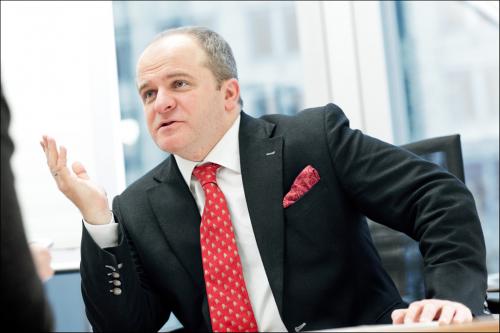Kowal: "In 10-15 years it will be natural to talk about Ukraine’s accession"
The Vilnius summit of the Eastern Partnership on 28-29 November could prove to be a milestone for EU-Ukraine relations, as both sides expect to sign the association agreement that would bring the country closer to the EU. The EP envoys Pat Cox and Aleksander Kwasniewski present their report on the Tymoshenko case during the Conference of Presidents. We talked about it with Paweł Kowal, a Polish member of the ECR group who is the chair of the EU-Ukraine Parliamentary Cooperation Committee.

Paweł Kowal
What do both sides bring to the summit? What are the expectations before meeting in Vilnius?
We’re going to Vilnius with a new budget for the Eastern Partnership and concrete legal proposals to be signed with Ukraine and to be initialed with Georgia and Moldova. We also propose visa-free movement for Moldova. They in turn will present us with the reforms they have carried out. The Eastern Partnership, despite being widely criticised for a lack of intensity, is bearing fruit and has become a serious political instrument.
Is there anything that could undermine signing the deal? If so, is there a backup plan? What are the risks of such a turn of events?
The agreement has been negotiated, initialed, translated and legally revised. It is absolutely ready to be signed. What is needed now is the political consent of the Council. It depends on how the Timoshenko case is resolved, whether member states sign the deal or not.
We may postpone the agreement, but will there still be a political will for signing the deal in the near future? We risk waiting for at least 2.5 years.
How could the agreement affect EU relations with Ukraine and Russia?
Ukrainians would be able to feel at home, even though they’re not a part of the EU. In 10-15 years it will be natural to talk about Ukraine’s accession. We need to send a clear message to the people living in Eastern Partnership countries as well, and that could be, apart from the association agreements, introducing visa-free movement.
The agreement won’t change much for Ukraine-Russia relations. It will open new trade channels for Russians, who run their businesses there, allowing them to feel welcome in a shared home that is the EU. Being pragmatic, Russia will propose new, favourable economic relations to Ukraine after we sign the deal. There are too many close bonds for anyone to cut them.
On Wednesday Pat Cox and Aleksander Kwaśniewski will present the final report of their mission to Ukraine to the Conference of Presidents of the European Parliament. The summit of Eastern Partnership will take place in Vilnius on 28-29 November.
Source: European Parliament
- 323 reads
Human Rights
Ringing FOWPAL’s Peace Bell for the World:Nobel Peace Prize Laureates’ Visions and Actions

Protecting the World’s Cultural Diversity for a Sustainable Future

The Peace Bell Resonates at the 27th Eurasian Economic Summit

Declaration of World Day of the Power of Hope Endorsed by People in 158 Nations

Puppet Show I International Friendship Day 2020

